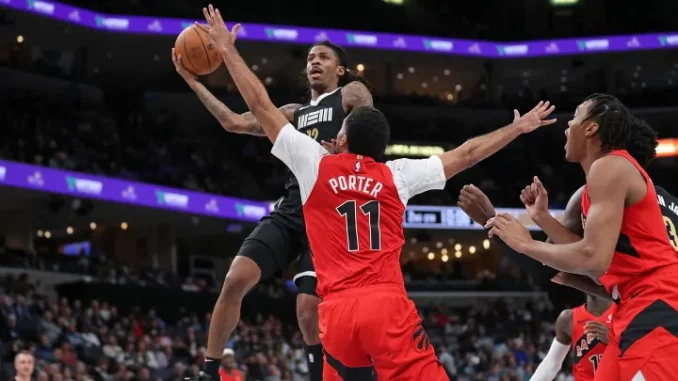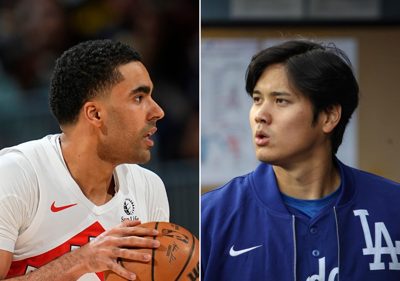
BLAST: Two Raptors key players on the verge to be dismissed from sport leagues.
The athletes being trusted to stay out of the sports betting fray tend to profile as precisely the type that finds sports betting irresistible.
Betting ads are plastered everywhere. Betting content is a fixture of game broadcasts. Anecdotal stories of disgruntled bettors harassing players and coaches from college to the pros are piling up.
There are those who will tell you the billions in betting money will keep piling up, too, so long players and coaches and referees can be kept away from betting scandals.
This past week suggested that last part might be easier said than done. Who knows where the story of Shohei Ohtani and his alleged degenerate gambler of a since-fired interpreter will end up? Ohtani hasn’t answered a single question on the matter; in his only relevant public utterance, the L.A. Dodgers slugger insisted the interpreter stole millions from him to pay off sports-betting debts. Perhaps one of the handful of investigations underway in relation to the case — from the U.S. federal authorities, the U.S. Internal Revenue Service and Major League Baseball — will eventually shed more light.
And if it seems easier to predict where the case of Raptors centre Jontay Porter and The Suspicious Prop Bets is headed — judging from his social-media footprint let’s just say Porter, currently under investigation by the league, seems like the self-styled entrepreneur who might try to make up lost NBA wages by betting the over on his potential suspension — there’s always a chance Porter is the innocent victim of a horrible misunderstanding. Time will tell.
What’s clear is that North America’s big sports leagues have a bevy of gambling-related problems on their hands. And as more than a few experts have pointed out, the athletes being trusted to stay out of the sports betting fray tend to profile as precisely the type that finds sports betting irresistible.
“Everything that makes a young athlete good at sports, never giving up, obsessive compulsive desire to win, complete over-competitiveness, overcoming incredible odds with their feats of excellence — all of it makes them prone to gambling,” said Declan Hill, the match-fixing expert and academic researcher from the Henry C. Lee College of Criminal Justice and Forensic Science at the University of New Haven.
And here’s the other problem.
Betting ads are plastered everywhere. Betting content is a fixture of game broadcasts. Anecdotal stories of disgruntled bettors harassing players and coaches from college to the pros are piling up.
There are those who will tell you the billions in betting money will keep piling up, too, so long players and coaches and referees can be kept away from betting scandals.
This past week suggested that last part might be easier said than done. Who knows where the story of Shohei Ohtani and his alleged degenerate gambler of a since-fired interpreter will end up? Ohtani hasn’t answered a single question on the matter; in his only relevant public utterance, the L.A. Dodgers slugger insisted the interpreter stole millions from him to pay off sports-betting debts. Perhaps one of the handful of investigations underway in relation to the case — from the U.S. federal authorities, the U.S. Internal Revenue Service and Major League Baseball — will eventually shed more light.
And if it seems easier to predict where the case of Raptors centre Jontay Porter and The Suspicious Prop Bets is headed — judging from his social-media footprint let’s just say Porter, currently under investigation by the league, seems like the self-styled entrepreneur who might try to make up lost NBA wages by betting the over on his potential suspension — there’s always a chance Porter is the innocent victim of a horrible misunderstanding. Time will tell.
What’s clear is that North America’s big sports leagues have a bevy of gambling-related problems on their hands. And as more than a few experts have pointed out, the athletes being trusted to stay out of the sports betting fray tend to profile as precisely the type that finds sports betting irresistible.
“Everything that makes a young athlete good at sports, never giving up, obsessive compulsive desire to win, complete over-competitiveness, overcoming incredible odds with their feats of excellence — all of it makes them prone to gambling,” said Declan Hill, the match-fixing expert and academic researcher from the Henry C. Lee College of Criminal Justice and Forensic Science at the University of New Haven.

“And all of those same qualities also make them terrible gamblers,” Hill said.
Those same qualities can also be the harbingers of gambling compulsion. And the list of athletes who have fallen victim to its pull is considerable. Hockey has Evander Kane, who a while back acknowledged a gambling addiction after declaring bankruptcy. Golf has Phil Mickelson, who has acknowledged the powerfully negative effects of a gambling habit that saw him wager an estimated $1 billion (U.S.) in a 30-year span, according to Mickelson’s former betting partner, Billy Walters. There’s a raft of cautionary tales in European soccer, where betting among players has been called “an epidemic.” In a performance-conscious world where unhealthy vices like smoking and drinking are less embraced, video gaming and gambling are among the go-to stress relievers of the era.
Those stories are instructive for a handful of reasons. For one, they tend to discredit a common bit of logic employed by those who would suggest pro athletes aren’t at risk of poor decisions around gambling. The logic seems sound on the surface, the idea that these guys make so much money and therefore would never feel compelled to cross any gambling-related lines.
Mickelson, who is among the richest pro athletes of his generation, would suggest it’s never simply about the cash. It’s about the rush. It’s about being right. It’s about ego and alpha-male competitiveness and living on the edge. It’s about feeding demons that, for some, seem at times insatiable.
Leave a Reply